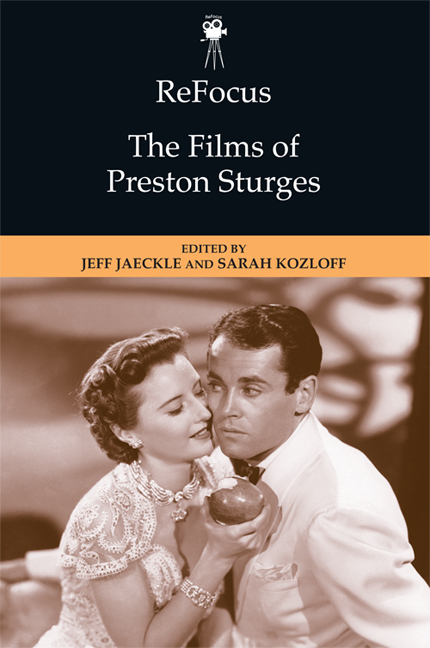Book contents
- Frontmatter
- Contents
- List of Figures
- Notes on Contributors
- Introduction: An Agile Mind—The Many Stands of Preston Sturges
- Part 1 Contexts: Genre, Studio, Authorship
- Part 2 Cultural Commentary: History and Identity
- Part 3 Technique: Scripting, Performance, Music
- Part 4 Impact: Reception/Reputation
- 12 Thrust with a Rapier and Run: The Critics and Preston Sturges
- 13 Hail the Conquering Auteur: Preston Sturges in La Revue du cinéma (1946–1949)
- 14 O Preston, Where Art Thou?
- Index
12 - Thrust with a Rapier and Run: The Critics and Preston Sturges
from Part 4 - Impact: Reception/Reputation
Published online by Cambridge University Press: 05 September 2016
- Frontmatter
- Contents
- List of Figures
- Notes on Contributors
- Introduction: An Agile Mind—The Many Stands of Preston Sturges
- Part 1 Contexts: Genre, Studio, Authorship
- Part 2 Cultural Commentary: History and Identity
- Part 3 Technique: Scripting, Performance, Music
- Part 4 Impact: Reception/Reputation
- 12 Thrust with a Rapier and Run: The Critics and Preston Sturges
- 13 Hail the Conquering Auteur: Preston Sturges in La Revue du cinéma (1946–1949)
- 14 O Preston, Where Art Thou?
- Index
Summary
The 1982 biography of Preston Sturges by James Curtis, Between Flops, reflects Sturges's own evaluation of his Hollywood career. Curtis quotes Sturges as saying: “Between flops, it is true, I have come up with an occasional hit, but compared to a good boxer's record, my percentage has been lamentable.” Indeed, the current master narrative regarding Sturges's place in film history is that of a publicly flamboyant, self-promoting Hollywood writerdirector who experienced a dramatic critical and box-office rise and fall. This personal story is made even more compelling in that it parallels a key theme in his most canonical films, the collision of luck, fate, and human fragility played out in both personal and public spheres. As Jared Rapfogel noted with regard to Sturges's films:
None of Preston Sturges's characters are allowed to have purely private lives … In almost every film, the private becomes (if it isn't already) public—the characters’ individual stories are seized upon and inflated into (more often than not a political) spectacle, sometimes according to their wishes, usually not. Sturges's protagonists therefore tend to become a kind of gateway into a broader portrait of a community and its political and social functioning (or more accurately, malfunctioning).
Indeed, Sturges has become something like a character in one of his own movies, and his very public career in Hollywood has often overtaken a nuanced critical study of his body of work. As Dan Pinck complained in a 1992 essay in The American Scholar, in the five decades following the end of Sturges's Hollywood career the smattering of books on the writer-director had largely been limited to popular biographies. Pinck's review of three influential Sturges biographies—Curtis's Between Flops (1982), the adapted semi-autobiography by Sandy Sturges, Preston Sturges by Preston Sturges (1990), and Donald Spoto's Madcap: The Life of Preston Sturges (1990)—found all three wanting in providing critical insight into the value of Sturges's body of work. As Pinck says of Spoto's biography, “Moviemaking becomes a sideline, almost a framework of irrelevance; what is lacking is a sharp understanding of his movies and how Sturges made them … Analysis of Sturges's movies or what might have influenced his perceptions of comedy is thin.”
- Type
- Chapter
- Information
- ReFocus: The Films of Preston Sturges , pp. 261 - 279Publisher: Edinburgh University PressPrint publication year: 2015



